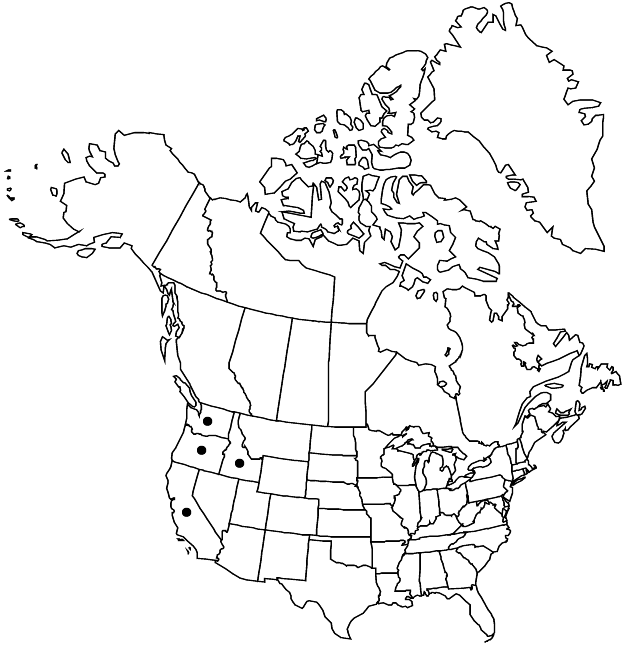Difference between revisions of "Eriogonum compositum"
Edwards’s Bot. Reg. 21: plate 1774. 1835.
FNA>Volume Importer |
FNA>Volume Importer |
||
| Line 21: | Line 21: | ||
|distribution=w United States. | |distribution=w United States. | ||
|discussion=<p>Varieties 3 (3 in the flora).</p><!-- | |discussion=<p>Varieties 3 (3 in the flora).</p><!-- | ||
| − | --><p><i>Eriogonum compositum</i> is one of the more attractive members of the genus and does well in cultivation. The three varieties are only weakly differentiated, and both <i></i>var.<i> lancifolium</i> and <i></i>var.<i> leianthum</i> merge with <i></i>var.<i> compositum</i>. The butterfly Euphilotes enoptes is a pollinator of this species.</p><!-- | + | --><p><i>Eriogonum compositum</i> is one of the more attractive members of the genus and does well in cultivation. The three varieties are only weakly differentiated, and both <i></i></i>var.<i><i> lancifolium</i> and <i></i></i>var.<i><i> leianthum</i> merge with <i></i></i>var.<i><i> compositum</i>. The butterfly Euphilotes enoptes is a pollinator of this species.</p><!-- |
--><p>The Okanagan-Colville Indians of British Columbia and Washington used plants of <i>Eriogonum compositum</i> as a cold remedy, an antidiarrheal, and a wash for infected cuts. Not surprisingly, children used the hollow, often slightly inflated stems as a toy (N. J. Turner et al. 1980).</p> | --><p>The Okanagan-Colville Indians of British Columbia and Washington used plants of <i>Eriogonum compositum</i> as a cold remedy, an antidiarrheal, and a wash for infected cuts. Not surprisingly, children used the hollow, often slightly inflated stems as a toy (N. J. Turner et al. 1980).</p> | ||
|tables= | |tables= | ||
| Line 65: | Line 65: | ||
|publication year=1835 | |publication year=1835 | ||
|special status= | |special status= | ||
| − | |source xml=https://jpend@bitbucket.org/aafc-mbb/fna-data-curation.git/src/ | + | |source xml=https://jpend@bitbucket.org/aafc-mbb/fna-data-curation.git/src/f6b125a955440c0872999024f038d74684f65921/coarse_grained_fna_xml/V5/V5_718.xml |
|subfamily=Polygonaceae subfam. Eriogonoideae | |subfamily=Polygonaceae subfam. Eriogonoideae | ||
|genus=Eriogonum | |genus=Eriogonum | ||
Revision as of 21:09, 24 September 2019
Herbs, erect, infrequently polygamodioecious, 2–4(–7) × 2–5 dm; floccose or glabrous. Stems: caudex spreading; aerial flowering stems erect, slender or stout, hollow, often slightly fistulose, arising at nodes of caudex branches and at distal nodes of short, nonflowering aerial branches, 1–5 dm, floccose or glabrous. Leaves basal, occasionally in rosettes; petiole 4–10(–15) cm, tomentose; blade lanceolate or ovate to deltoid, (2–)7–25 × (0.7–)1–8 cm, densely white-lanate to tomentose abaxially, less so to glabrate and greenish adaxially, margins entire, plane. Inflorescences umbellate or compound-umbellate, 3–20 × 3–20 cm; branches floccose or glabrous; bracts 3–several, leaflike or semileaflike at proximal nodes, linear to linear-lanceolate, 1–3(–6) cm, scalelike distally, usually 1–5 × 0.5–3 mm. Involucres 1 per node, turbinate-campanulate to campanulate, 6–10 × 4–10 mm, sparsely to densely lanate, weakly glandular-puberulent, or glabrous; teeth (5–)7–10, usually not lobelike, erect to weakly reflexed, 2–4 mm. Flowers 5–6 mm, including 0.7–1.5 mm stipelike base; perianth pale to bright yellow, occasionally ochroleucous, glabrous; tepals monomorphic, oblong to oblong-ovate; stamens slightly exserted, 4–8 mm; filaments pilose proximally. Achenes light brown, 5–6 mm, glabrous except for sparsely pubescent beak.
Distribution

w United States.
Discussion
Varieties 3 (3 in the flora).
Eriogonum compositum is one of the more attractive members of the genus and does well in cultivation. The three varieties are only weakly differentiated, and both var. lancifolium and var. leianthum merge with var. compositum. The butterfly Euphilotes enoptes is a pollinator of this species.
The Okanagan-Colville Indians of British Columbia and Washington used plants of Eriogonum compositum as a cold remedy, an antidiarrheal, and a wash for infected cuts. Not surprisingly, children used the hollow, often slightly inflated stems as a toy (N. J. Turner et al. 1980).
Selected References
None.
Lower Taxa
Key
| 1 | Leaf blades lanceolate; Chelan, Kittitas, Okanogan, and Yakima counties, Washington | Eriogonum compositum var. lancifolium |
| 1 | Leaf blades ovate to deltoid; widespread | > 2 |
| 2 | Involucres sparsely to densely lanate; n California, wc Idaho, Oregon, and Washington | Eriogonum compositum var. compositum |
| 2 | Involucres glabrous or weakly glandular-puberulent; wc Idaho, ne Oregon, and e Washington | Eriogonum compositum var. leianthum |